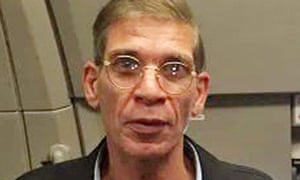
For almost six hours Seif Eldin Mustafa held the world in suspense after hijacking an EgyptAir plane on a short flight from Alexandria to Cairo, then diverting it across the Mediterranean to Cyprus.
A standoff was played out on the tarmac of Larnaca international airport. Members of the island’s anti-terror squad surrounded the plane, which was carrying with 55 passengers, and the busy airport was closed and sealed off. Officials said that Mustafa was wearing a suicide belt.
Was this another instalment of the terror stalking Europe? The work of jihadi terrorists in conflict with the Egyptian government? It turned out not to be; though the twists and turns of the narrative kept people guessing for hours.
All the signs of terror were there. Cypriot government ministers who had rushed to Larnaca, an airport more used to planeloads of tourists jetting in, held their breath. At 9.38am, underscoring the possibility of that scenario, EgyptAir tweeted: “Our flight MS181 is officially hijacked. We’ll publish an official statement now.”
The airbus was taken over less than 30 minutes into the flight and forced to reroute when the pilot learned that a man equipped with an explosive vest was among the passengers. But barely an hour after the A320’s enforced landing the first cracks began to emerge. As Mustafa allowed about 40 passengers to walk free – mostly women and children described as Egyptian nationals – he also started to make demands. The plane had been guided to the airport’s perimeter, its white and blue livery clearly visible through Larnaca’s ringed barbed-wire topped fence, in what was standard procedure for an aircraft believed to be under attack.
Mustafa wanted the heavy police presence around the plane to be removed. He also wanted political asylum.
Very soon, the lines between Nicosia and Cairo began to crackle. With the airport under a state of emergency, the Cypriot president, Nikos Anastasiades, called his Egyptian counterpart, Abdel Fatah al-Sisi, for urgent talks.
But then came a more unusual demand. Poking his head through the plane’s door the bespectacled hijacker, thought to be in his fifties, threw a four-page letter written in Arabic on to the tarmac and asked that it be delivered to his former wife, a Cypriot woman living in the village of Oroklini.
Suddenly the hijacking appeared to have a motive, one that took officials by surprise. Addressing reporters at a joint press conference given with Martin Schulz, the European parliament president, the Cypriot leader ruled out terror as a motive. Instead, he hinted, the episode appeared to be personal in nature and was linked to a Cypriot woman, subsequently named as Marina Parashkou, with whom the hijacker had once been involved. “In any case it’s all to do with a woman,” he said, before insisting that everything was being done to release the hostages. In Cairo an official at the ministry of foreign affairs also ruled out terrorism, saying: “He’s not a terrorist, he’s an idiot. Terrorists are crazy but they aren’t stupid. This guy is.”
The plot thickened when Egyptian authorities initially identified the hijacker as Ibrahim Samaha, describing him as a university professor en route to a conference at the University of Atlanta.
Mustafa was eventually identified when Samaha’s enraged wife contacted the Egyptian media to say her husband was a passenger on his way to Cairo to change flights and was “certainly not the hijacker”.
In Larnaca counterterrorism officials, now several hours into the siege, were far from calm. Seven crew members and at least five foreign nationals were still being held by the man, supposedly wearing an explosive vest. The hostages included Britons, Americans, Italians, Dutch, French and Belgians. The British Foreign Office later said it was offering assistance to four British nationals.
In addition to seeing his erstwhile wife, Mustafa was also now demanding that female prisoners be released in Egypt. It took more than an hour for Parashkou to appear at the airport, reportedly with a small child in tow.
Cypriot officials, announcing that the letter had been translated and handed to her, said Parashkou’s wish was to participate in negotiations between Mustafa and the police. “Our people, they were talking to him all the time in order to keep him busy and allow people to come out,” Nikos Christodoulides, a government spokesman, told NBC news. “He asked for asylum, he wanted to talk with someone from the European union … It seems that he [had] an unstable personality.”
No comments:
Post a Comment